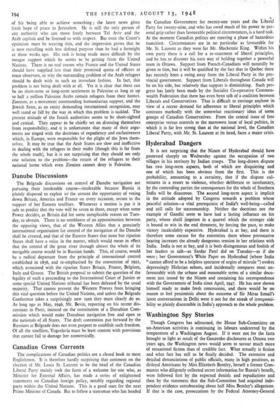Danube Discussions
The Belgrade discussions on control of Danube navigation are pursuing their intolerable course—intolerable because Russia is plainly disposed to exploit to the utmost the opportunity of voting down Britain, America and France on every occasion, secure in the support of her Eastern satellites. Whenever a motion is put it is safe to predict that the vote will be seven to three, except when some Power decides, as Britain did for some inexplicable reason on Tues- day, to abstain. There is no semblance of an approximation between the opposing views, that of the Western Allies that a genuinely international organisation for control of the navigation of the Danube shall be created, and that of the Eastern States that none but riparian States shall have a voice in the matter, which would mean in effect that the control of the great river through almost the whole of its navigable course would be in Russian hands. This, of course, would be a radical departure from the principle of international control established in 1856, and re-emphasised by the convention of 1921, which associated with the riparian States Britain, France, Belgium, Italy and Greece. The British proposal to submit the question of the legality of such a proceeding to the International Court of Justice or some special United Nations tribunal has been defeated by the usual majority. That cannot prevent the Western Powers from bringing this vital question before the United Nations, and unless the Belgrade Conference takes a surprisingly new turn they must clearly do so. As long ago as May, 1946, Mr. Bevin, reporting on his recent dis- cussions in Paris, insisted on the constitution of a Danubian Com- mission which would make Danubian navigation free and open to the nationals of all States. The draft convention put forward by the Russians at Belgrade does not even purport to establish such freedom. Of all the satellites, Yugoslavia must be least content with provisions that cannot fail to damage her economically.


































 Previous page
Previous page